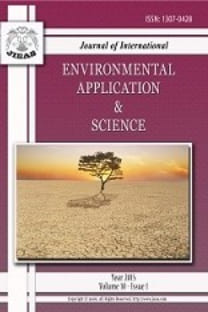Evaluation of Macroseismic Field of 21 September 2019, Durres Earthquake in Albania
The Albanian region is historically subjected to strong earthquakes (Io>VIII EMS-98), as gathered from the numerous data. Currently, the seismicity of the Durres’ region in Albania is characterized by high-energy earthquakes.
A moderate earthquake ML 5.8 struck the Durres in western Albania, on September 21, 2019. The macroseismic investigation were carried out based on online web survey managed by IGEWE and EMSC, the degree of damage to structures of human origin, and the surface effect of the ground shaking.
This shock was widely felt throughout Albania, in neighboring countries, Montenegro, Italy, Kosovo, North Macedonia and Greece, and in the epicentral area, EMS intensity reached VII-VIII degree. One main aspect that has great influence on the scale of the felt throughout these countries is related to the depth of the main shocks. A statistical analysis was applied to the data collected to investigate the spatial distribution of intensity of these earthquakes. Effects reported in from towns and villages are analyzed in depth. The intensity map consists of the geographical distribution of intensities averaged for each town or village. This map is compiled and later is continuously updated from others information’s. Isoseismals represent the spatial distribution of macroseismic intensities, and their shapes depend on source properties, lithosphere structures, tectonic line orientations, site geology,.and topography. Our results identify two main areas of amplification and de-amplification of earthquake intensity.
This paper gives assessment of intensity, of attenuation function for intensity of this earthquakes, intensity isoseismic map and evaluation of seismic hazard in Western Albania.
Keywords:
Earthquakes, Questionnaire Macroseismic Intensity, Attenuation,
___
- Aliaj Sh, Kociu S, Muco B, Sulstarova E. (2010) Seismicity, seismotectonics and seismic hazard assessment in Albania. Published, Academy of Science of Albania, 59-65 pp. Tirane.
- Bozo Rr, Ormeni Rr, Gjuzi O (2017).” Fast Information Exchange and Evaluation of Macroseismic Field of Moderate 2017 Albanian Earthquakes” J. Int. Environmental Application & Science, “JIEAS” Selçuk University, Turkey, Vol 12, Issue 2,
- De Rubeis Valiero., Paola Sbarra., Patrizia Tosi. (2016) “Regional macroseismic field and intensity residuals of the August 24, 2016, Mw=6.0 central Italy earthquake” Annals of Geophysics, 59, Fast Track 5, 2016, 57-63 pp;
- Grünthal G. (1998) European Macroseismic Scale. (1998) (EMS-98), Cahiers du Centre Européen de Géodynamique et de Séismologie 15, Centre Européen de Géodynamique et de Séismologie, Luxembourg, 99 pp.
- Muço, B., and P. Minga, 1992, Anelastic-attenuation coefficient and the correction of Ao values of Richter magnitude formula for Albania: Geofizika, p. 123-132.
- Ormeni Rr. (2013) “3D Velocity structure of the Albania region obtained by inversion of local earthquake data” 7the Congress of the Balkan Geophysical Society, 7-10 October 2013, 3-4 pp Tirana, Albania
- Ormeni Rr, Koci R, Dushi E, Minarolli A, Gjuzi O, Hajrullai S, Dushi I (2019). “Monthly Seismological Bulletin “(ISSN), September 2019. Web. www.igeo.edu.al.
- Sbarra P, Tosi P, De Rubeis V, Ferrari. (2010). Web based macroseismic survey of 2009 L’Aquila earthquakes sequence. News_letter_emsc 2010, Monteller, France. 7 pp
- Sulstarova, E., Muço, B., 1983. Fusha makrosizmike e tërmetit të 15 prillit 1979. Tërmeti i 18 prillit, Shtëpia Botuese 8 Nëntori, pp. 167-186 (shqip-anglisht)
- Tosi, P., Sbarra, P., De Rubeis, V. and Ferrari, C. (2015) Macroseismic intensity assessment method for webquestionnaires. Seismological Research Letters, 86:985-990 pp,
- ISSN: 1307-0428
- Yayın Aralığı: Yılda 4 Sayı
- Başlangıç: 2006
- Yayıncı: Selçuk Üniversitesi
